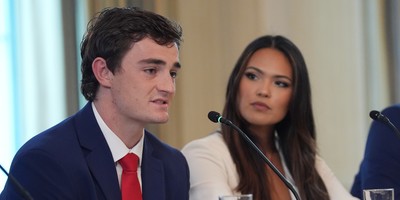Monday night witnessed the latest drop in the steady drip, drip, drip involving the Trump administration and Russia, this one from the Washington Post. The new developments present something of a political Rorschach test, which I'll explain in a moment -- but first, the reported details:
President Trump asked two of the nation’s top intelligence officials in March to help him push back against an FBI investigation into possible coordination between his campaign and the Russian government, according to current and former officials. Trump made separate appeals to the director of national intelligence, Daniel Coats, and to Adm. Michael S. Rogers, the director of the National Security Agency, urging them to publicly deny the existence of any evidence of collusion during the 2016 election. Coats and Rogers refused to comply with the requests, which they both deemed to be inappropriate, according to two current and two former officials, who spoke on the condition of anonymity to discuss private communications with the president. Trump sought the assistance of Coats and Rogers after FBI Director James B. Comey told the House Intelligence Committee on March 20 that the FBI was investigating “the nature of any links between individuals associated with the Trump campaign and the Russian government and whether there was any coordination between the campaign and Russia’s efforts.”
NBC News and other outlets confirmed this report. More potentially damning is this passage, which suggests -- without attribution and without identifying the alleged culprits, I'll note -- that senior White House officials discussed methods of "intervening" with then-FBI Director James Comey on the Flynn probe, possibly in order to get it "shut down." That would comport with the president's alleged efforts along those lines, according to a yet-unseen memo drafted by Comey shortly after a February meeting with Trump:
Recommended
If true, this would seem to go a step further than mere "hope" Comey could let the investigation go pic.twitter.com/KeOgzoMIjL
— John McCormack (@McCormackJohn) May 22, 2017
At the very least, this is just another instance of Team Trump looking rather guilty, which can be distinct from being guilty. Which brings me to the aforementioned Rorschach test. First, for the sake of argument, let's clear out both the reflexive Trump defenders who dismiss all negative developments as "fake news" aimed at overthrowing the president in a "coup," as well as all the knee-jerk Trump haters who were frothing at the mouth about "impeachment" long before any shred of supporting evidence had crept into the public eye. I'd estimate that most of the remaining observers of this unfolding drama fall into two categories: (1) People who are inclined to believe that top Trump figures -- and possibly the president himself -- are probably guilty of colluding with the Russians during the 2016 election, and are trying to cover it up. (2) People who are inclined to believe that Trump and friends are likely innocent of the "underlying crime," but that an impetuous, petulant president was (and is) so obsessed with negative coverage of the Russia storyline that he pushed all bounds of propriety and common sense in a remarkably clumsy attempt to defend himself. Option one amounts to, "this stuff is true, so let's shut down and obstruct the investigations." Option two is, "these are baseless theories that are trying to destroy us as illegitimate, so let's do what it takes to fight the narrative. I don't care, just do it."
I'm open to the former notion, but as of now, I still lean toward the latter. Based on current evidence -- and Trump's conduct over decades of adult life -- reckless and myopic buffoonery, unencumbered by traditional emotional guardrails, strikes me as a more plausible explanation than sinister or nefarious criminality. Neither frame is flattering for the president, mind you, but one would be far more legally grave. Yes, the specifics of last night's Washington Post story could easily be applied to establish a pattern of deeply unethical behavior, apparently designed to impede active investigations with reaches into the administration. But the reported actions could also be viewed as the desperate and ill-conceived flailings of an angry president who wanted credible governmental figures to swat down rumors and innuendo that he saw as slanderous -- and as the foolish, ad hoc "crisis management" spasms of amateur-laden staff (ahem) whose irate boss ordered them to 'make the lies stop.' Again, I have my suspicions, but I'm also fully supportive of Robert Mueller's active probe into all of this. The truth matters. Obstruction of justice is a specifically-defined act in this context. As for Congress' role, have we reached the point of "high crimes and misdemeanors" yet? I don't believe so, but let's keep following the facts.
Meanwhile, the water may be getting even hotter for Trump's fired National Security Adviser, who seems to realize he may be in serious legal jeopardy. And some suspected leakers at the White House might be on the brink of hearing an extra-furious "you're fired" from Donald Trump. I'll leave you with a fresh reminder that partisan tribalism and media sloppiness-slash-dishonesty can up the ante of conspiratorial thinking:
More Dems now believe Russia tampered with the vote, after the FBI and NSA said they didn't. https://t.co/mJhdOVJdjw pic.twitter.com/3u3gCgQrZH
— Ashley Rae (@Communism_Kills) May 22, 2017
A 55 percent majority of Democrats polled falsely believe something is "definitely" or "probably" true that verifiably did not.

























Join the conversation as a VIP Member